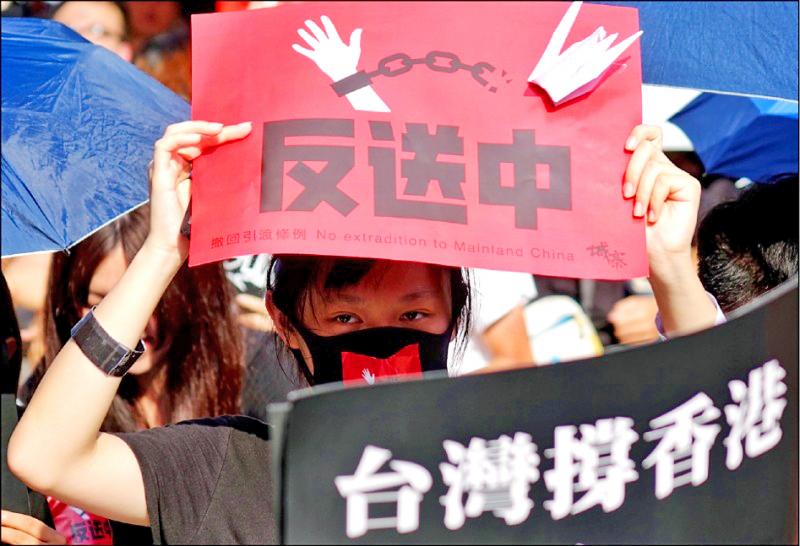About 200 Hong Kong protesters have come to Taiwan to immigrate for “political reasons” since June last year, and authorities accepted the applications of about 20 of them, Taiwan Association for Human Rights secretary-general Shih Yi-hsiang (施逸翔) said on Tuesday.
The approvals followed investigations by the Mainland Affairs Council and the National Immigration Agency, he said.
The applications were made according to Article 18 of the Act Governing Relations with Hong Kong and Macau (香港澳門關係條例), Shih said.

Photo: Chung Li-hua, Taipei Times
“However, there is still a significantly larger number of people waiting for their cases to be processed,” he added.
The article stipulates that: “Necessary assistance shall be provided to Hong Kong or Macau residents whose safety and liberty are immediately threatened for political reasons.”
However, due to the politically sensitive nature of the issue and its implications for cross-strait relations, the government has not publicized information about the cases handled according to the article.
The Presbyterian Church in Taiwan has since July last year provided assistance to more than 200 Hong Kongers, Pastor Huang Chun-sheng (黃春生) said, adding that their ages ranged from one to more than 50.
Some of them were protesters who were ordered by Hong Kong police to appear in court, but they instead fled to Taiwan with lightly packed bags before their court date, he said.
“They showed up at the church in the winter wearing nothing but short-sleeved shirts and sandals, asking for help,” he said.
The church mainly provided shelter and psychological guidance to the protesters seeking help, Huang said, adding that it also helped some of them find accommodation or enroll in schools.
“We helped one person apply to a medical school, and a Taiwanese doctor offered to help pay their tuition and stick with them through their study,” he said.
As the church was not familiar with the protesters’ backgrounds, it asked Daniel Wong (黃國桐), a Hong Kong lawyer and politician who provided volunteer legal services to protesters last year, to interview them, Huang said.
The church helped those who were determined to take risks to stay in Taiwan, Huang said.
If they apply for immigration through Article 18, their case would undergo three evaluations, he said.
However, as the article is not clearly worded, most applications get processed only if they are handed over to authorities by someone on behalf of the applicant, Huang said.
Lin Chun-hung (林俊宏), a Taiwanese lawyer who represents Hong Kong protesters hoping to immigrate to Taiwan, said that residency cases for Hong Kong applicants vary in complexity depending on the method the applicant uses.
Those who apply as students are easily processed, while those who apply for work permits must first find an employer and a job with a monthly salary of at least NT$47,000, he said.
Cases involving dual citizenship, dependent family members or same-sex couples — which are not legally recognized in Hong Kong — are more complex, he said.
The rules must be more clearly defined so that a system can be followed when processing applications from prospective Hong Kong immigrants, he said.

Taiwanese can file complaints with the Tourism Administration to report travel agencies if their activities caused termination of a person’s citizenship, Mainland Affairs Council Minister Chiu Chui-cheng (邱垂正) said yesterday, after a podcaster highlighted a case in which a person’s citizenship was canceled for receiving a single-use Chinese passport to enter Russia. The council is aware of incidents in which people who signed up through Chinese travel agencies for tours of Russia were told they could obtain Russian visas and fast-track border clearance, Chiu told reporters on the sidelines of an event in Taipei. However, the travel agencies actually applied

Japanese footwear brand Onitsuka Tiger today issued a public apology and said it has suspended an employee amid allegations that the staff member discriminated against a Vietnamese customer at its Taipei 101 store. Posting on the social media platform Threads yesterday, a user said that an employee at the store said that “those shoes are very expensive” when her friend, who is a migrant worker from Vietnam, asked for assistance. The employee then ignored her until she asked again, to which she replied: "We don't have a size 37." The post had amassed nearly 26,000 likes and 916 comments as of this

New measures aimed at making Taiwan more attractive to foreign professionals came into effect this month, the National Development Council said yesterday. Among the changes, international students at Taiwanese universities would be able to work in Taiwan without a work permit in the two years after they graduate, explainer materials provided by the council said. In addition, foreign nationals who graduated from one of the world’s top 200 universities within the past five years can also apply for a two-year open work permit. Previously, those graduates would have needed to apply for a work permit using point-based criteria or have a Taiwanese company

The Shilin District Prosecutors’ Office yesterday indicted two Taiwanese and issued a wanted notice for Pete Liu (劉作虎), founder of Shenzhen-based smartphone manufacturer OnePlus Technology Co (萬普拉斯科技), for allegedly contravening the Act Governing Relations Between the People of the Taiwan Area and the Mainland Area (臺灣地區與大陸地區人民關係條例) by poaching 70 engineers in Taiwan. Liu allegedly traveled to Taiwan at the end of 2014 and met with a Taiwanese man surnamed Lin (林) to discuss establishing a mobile software research and development (R&D) team in Taiwan, prosecutors said. Without approval from the government, Lin, following Liu’s instructions, recruited more than 70 software